Table of Contents
Hello, my radiant readers, and welcome to another spectacular session of your favorite beauty deep-dive! Today, we will demystify one of the most hotly-debated topics in the skincare world – does coconut oil darken the skin? It’s a question that seems to have left everyone from skincare novices to seasoned beauticians scratching their heads in puzzlement, and you know me—I can never resist the allure of a beauty mystery.
Whether you’ve stumbled upon this through a late-night Google search or are a loyal reader seeking clarity, you’ve come to the right place. Together, we will dive headfirst into the ocean of information (or misinformation) and emerge with not just answers but a comprehensive understanding. After all, the ‘why’ behind the ‘what’ is where the real learning lies.
Over the following few paragraphs, we will bring you a balanced cocktail of science, expert opinions, and real-life experiences that aims to answer this question and enhance your understanding of how different ingredients interact with our skin. We’ll sift through various studies, consider potential contributing factors, and shed light on the broader picture of coconut oil and its role in skincare.
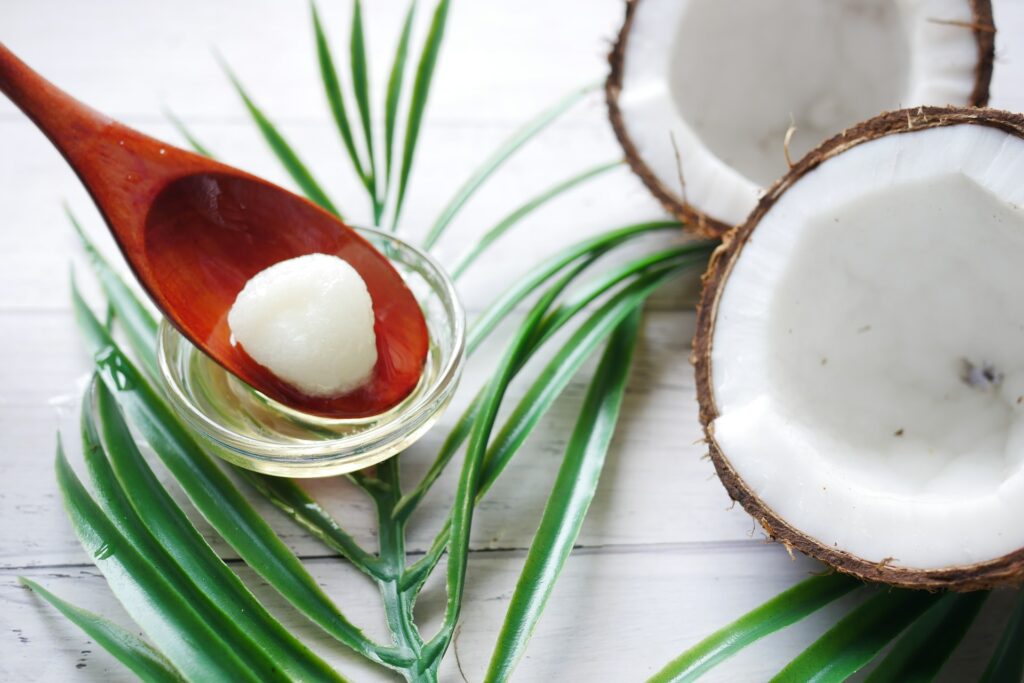
This isn’t just another quick-fix blog post; it’s your guide to the controversial relationship between coconut oil and skin color. So, fasten your seatbelts, beauties! We’re in for an informative, empowering, and incredibly engaging ride. Remember, knowledge is the first step towards becoming the master of your skincare routine, and today, we’re diving deep into the coconut-laden tropics of understanding.
Unmasking Coconut Oil: What’s in the Nut?
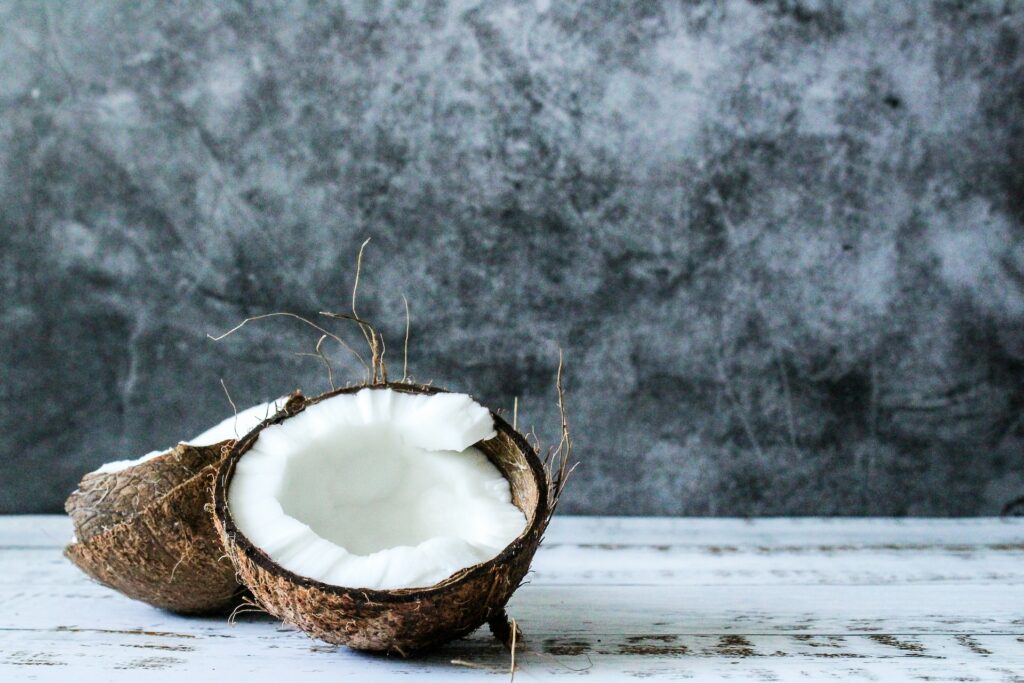
First things first, what is coconut oil? It’s a vegetable oil extracted from the meat, or ‘kernel,’ of mature coconuts. Its superpower lies in its high concentration of medium-chain fatty acids—quickly metabolized saturated fats that pack a whole host of health benefits.
I remember my grandmother always had a jar of coconut oil in her kitchen, using it for virtually everything—from deep frying to hair conditioning. It’s an age-old edible oil that’s recently gained new life as a skin care and hair care star, and even a fancy cooking substitute, thanks to its impressive nutritional profile.
Coconut oil is rich in lauric, caprylic, capric, and monounsaturated fats. This cocktail of nutrients reduces inflammation and serves up a dose of essential vitamins and minerals. It’s truly a gift from nature!
Delving Into the Properties of Coconut Oil
For centuries, coconut oil has been a staple in both the kitchen and beauty regimen of many cultures, but only recently has its many health benefits received global recognition.
What sets coconut oil apart? The abundance of medium-chain triglycerides (MCTs) promotes healthy metabolism and balances hormone levels. But wait, there’s more! It also flaunts antifungal, antibacterial, and antioxidant properties. These keep disease at bay while giving your skin that youthful glow we crave!
The Wonder Nut: Benefits of Coconut Oil for Skin
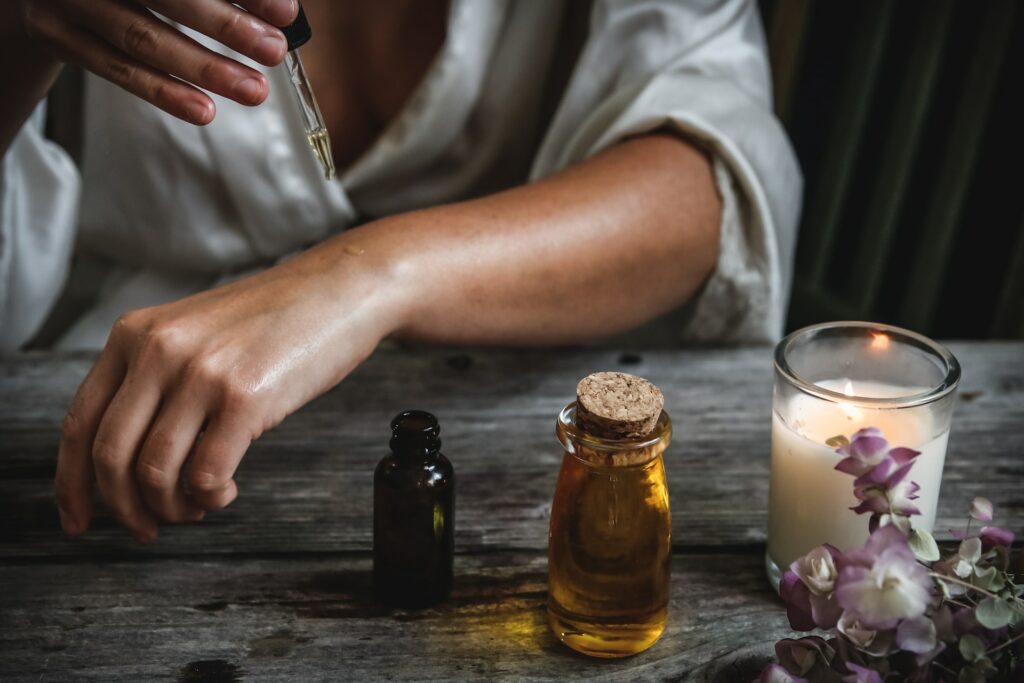
This humble tropical fruit oil is a true skincare superhero. You might miss out on many benefits if you still need to introduce it to your beauty routine.
Virgin coconut oil—my absolute favorite—works wonders as a moisturizer. I can’t count how it saved my skin from dry, cold winters. This could be your new holy grail for those suffering from dehydrated skin!
Beyond moisturizing, coconut oil also creates a protective barrier against environmental damage and irritants. This adds a layer of defense to your skin, keeping those pesky rashes and discomfort at bay.
Remember my best friend who always struggled with acne? She started using coconut oil as a part of her skincare routine, and the antibacterial qualities of this natural elixir helped combat her breakouts and reduce inflammation.
Even if you’re more on the oily side, like me, don’t shy away. Coconut oil helps balance your skin’s natural oils and prevent overproduction, which can lead to breakouts. Plus, it’s a fantastic make-up remover—goodbye stubborn waterproof mascara!
For anyone with uneven skin tone or dark spots, coconut oil stimulates collagen production, promoting a brighter, more radiant complexion.
I typically warm a small amount between my hands until it melts, then massage it gently onto my face in circular motions. After a few minutes, I wash it off with lukewarm water (be sure to avoid your eyes). Depending on your skin’s tolerance, you can repeat this process a few times a week.
However, beauty explorers, remember this golden rule—moderation is vital. Overuse could clog pores and irritate them. So, always proceed cautiously, whether you’re using coconut oil or any other skincare remedy. Your skin will thank you!
Diving Deep into the Hydration Power of Coconut Oil
Hello, beautiful readers! In my beauty journey, one tropical treat has consistently remained a staple in my skincare routine – coconut oil. This multitasking marvel has been quenching thirsty skin for centuries. Whether it’s dry, flaky patches or an uneven complexion, coconut oil comes to the rescue!
You know, it’s all about the fats! Both unrefined and refined coconut oil are brimming with saturated fats that provide a protective layer on your skin, locking in that much-needed moisture. But the magic doesn’t stop at the surface; coconut oil dives deep into your skin, delivering essential nutrients such as vitamin E, proteins, and lauric acid, a hydration hero.
In my experience, coconut oil really ups my skin’s hydration game. It helps reduce water loss from deeper layers, keeping my skin plump and moisturized for longer. On top of that, its antimicrobial properties can be a real game-changer for tackling pesky skin conditions like acne.
Remembering its ability to boost collagen production in our bodies, coconut oil is like a fountain of youth for our skin. And here’s a tidbit – it’s packed with Vitamin A, which works wonders to maintain our skin’s elasticity and rectify discoloration issues.
My top tip? Opt for non-refined coconut oil for maximum hydration. It boasts higher antioxidant levels than its fully refined counterparts and is free from artificial preservatives. So, if you’re grappling with dry patches or uneven skin tone, it might be time to call in the coconut oil cavalry!
Finding Your Skin’s Tropical Match: Is Coconut Oil for You?
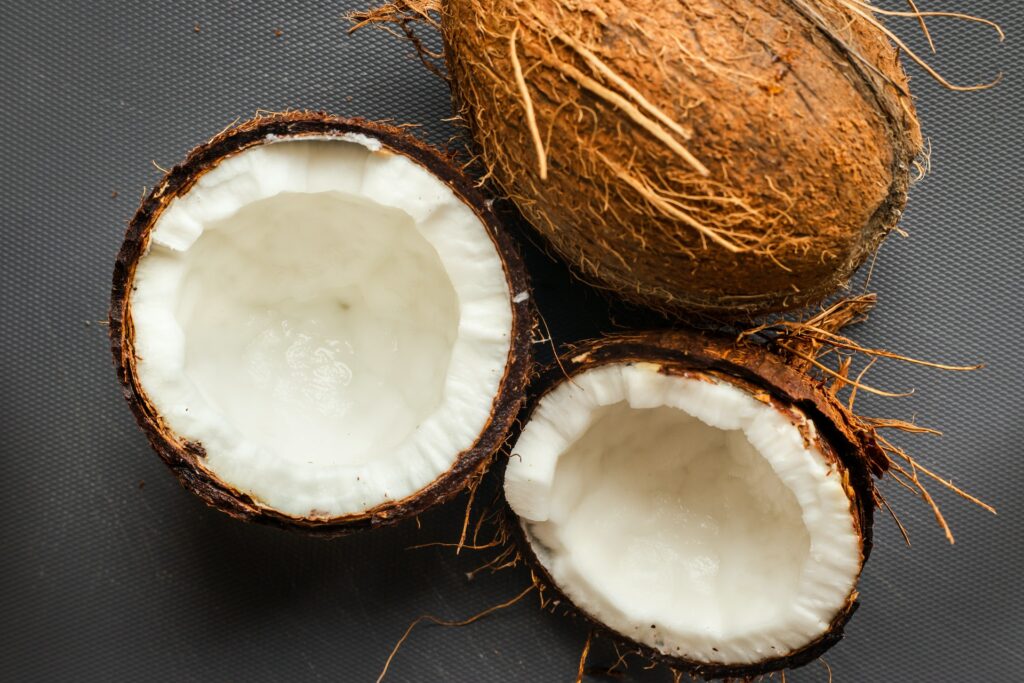
You might wonder, “Is coconut oil suitable for my skin type?” Well, good news! Coconut oil is like that one-size-fits-all outfit everyone needs in their wardrobe—it’s perfect for all skin types.
Even if your skin leans towards the acne-prone side, don’t fret. A light layer of coconut oil won’t clog your pores. Instead, it’ll serve as a faithful knight, shielding your skin against breakouts. Moreover, coconut oil can amp up your glow game, encouraging cell turnover and deep hydration.
And guess what? It’s not just your skin that enjoys the coconut oil party. This oil is a godsend for your hair too! Packed with fatty acids, coconut oil is the perfect remedy for a dry scalp or parched ends.
Try incorporating coconut oil directly into your skincare routine or mix it into facial masks or scrubs. You’ll see how well this nature’s gift fends off environmental damage while dishing out intense nourishment.
The Great Debate: Does Coconut Oil Darken Skin?
The question floating around the beauty community is whether coconut oil darkens the skin. Well, let’s put the rumors to rest.
Studies suggest coconut oil does not significantly darken the skin when used as directed. However, just like that, I accidentally added too much salt to my soup; using too much coconut oil or leaving it on for an extended period can lead to some darkening.
Coconut oil is a champ at moisturizing and nourishing dry skin, offering protection against sun damage. But remember, balance is critical. Using excessive amounts might lead to an oily complexion or potential darkening. So, always remember to do a patch test first and use it in moderation.
If the fear of darkening has you breaking into a cold sweat, consider alternatives like Argan or jojoba oil. They offer similar benefits without the risk of darkening after long-term use. It’s all about finding what works best for you!
Can Coconut Oil Influence Your Skin Color?
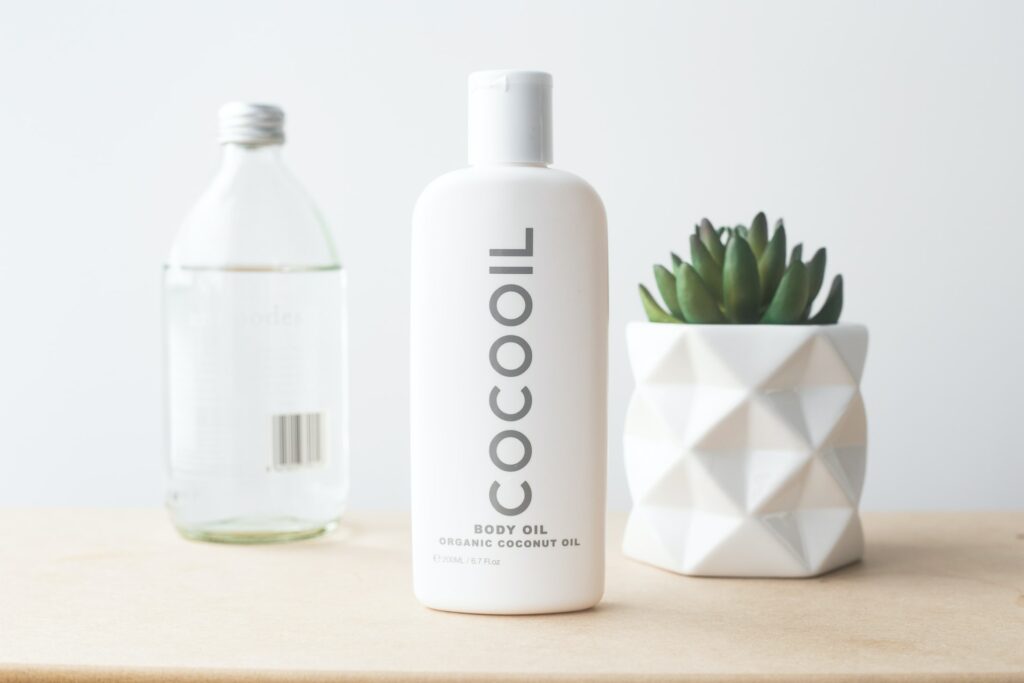
Here’s where things get a bit tricky. While coconut oil is an all-natural ingredient, everyone’s body chemistry differs. Some studies suggest that coconut oil may alter the levels or distribution of melanin, the pigment responsible for our skin tone.
If melanin is more concentrated in certain areas, your visible complexion could darken or lighten. So yes, there’s potential for coconut oil to affect your complexion, but it isn’t a proven fact. Other factors like genetics and lifestyle also play a significant role.
Remember, beauties, the journey to radiant skin is personal and unique. Whether you choose to invite coconut oil into your skincare routine or opt for alternatives, what matters most is finding what makes your skin feel happiest!
Cracking the Coconut: Side Effects of Coconut Oil
Hey beauty lovers! Today, let’s chat about a product that’s been all the rage in the beauty world – coconut oil. Coconut oil can be a game-changer like that daring sequin dress you’ve been dying to wear. But, as with all beauty products, it’s crucial to know the potential drawbacks too!
Coconut oil is often hailed as a skincare superhero and for good reason. It’s filled to the brim with antioxidant properties, offering a protective shield for our skin. It can help calm irritations and hydrate parched skin. Trust me, I’ve slathered this tropical goodness on my face overnight and woken up to softer, nourished skin.
If you want to invite coconut oil into your routine, I recommend going organic. Why, you ask? Well, it’s not processed or altered, making it less likely to contain additives that might harm your skin.
However, if your skin is more of an oil factory or prone to acne (trust me, I’ve been there), coconut oil might not be your skin’s best friend. It could clog your pores and invite unwanted breakouts. Remember, everyone’s skin is different, and what works for one person may not work for another.
Also, heads up! Although rare, some might experience an allergic reaction due to sensitivity to lauric acid found in coconut oil. If this happens, halt use immediately.
Coconut Oil and Your Face: A Match Made in Heaven or Hell?

Alright, beauties, let’s get down to the nitty-gritty. Is it safe to use coconut oil on your face? Coconut oil can be comedogenic, meaning it can play ‘hide and seek’ in your pores if you overdo it.
Only apply a thin layer of coconut oil to your face to keep this from happening. And remember quality matters! Always opt for a product with no unnecessary additives.
For my lovelies with oily skin, coconut oil might lead to more breakouts due to its highly occlusive nature. And those with sensitive skin should tread cautiously, as certain ingredients could cause allergic reactions. I learned this the hard way when I first started experimenting with skincare – always take it slow and listen to your skin!
Before applying anything new directly to your face, my go-to advice is to do a patch test on your arm. If any adverse side effects occur, discontinue use immediately.
4 Contributing Factors That Affect Coconut Oils Effectiveness On Darkening The Skin
When it comes to the potential darkening of the skin due to coconut oil, there are a few contributing factors to consider. While coconut oil itself doesn’t inherently darken the skin, certain practices or conditions can play a role:
- Sun Exposure: Extended exposure to sunlight can cause the skin to darken or tan. If coconut oil is applied to the skin and exposed to the sun without proper sun protection, it may intensify the tanning effect, giving the appearance of darker skin.
- Overuse or Heavy Application: Using excessive amounts of coconut oil or applying it too frequently can create a barrier on the skin, potentially preventing the skin from naturally shedding dead skin cells. This buildup of dead skin cells can make the skin appear dull or darker.
- Prolonged Contact Time: Leaving coconut oil on the skin for an extended period, especially if not properly washed off, can contribute to the potential darkening effect. This is why it’s important to follow the recommended usage instructions and avoid leaving coconut oil on the skin for prolonged periods.
- Individual Skin Response: Each person’s skin reacts differently to various ingredients. While coconut oil may not darken the skin for most individuals, some people may have a unique skin response due to factors such as genetics, skin sensitivity, or existing skin conditions.
7 Practical Tips If You Would Like To Use Coconut Oil But Don’t Want It To Darken Your Skin
- Start with a Patch Test: Before using coconut oil on your entire face or body, perform a patch test. Apply a small amount of coconut oil on a small area of your skin, such as your inner forearm. Wait 24 to 48 hours and observe for any adverse reactions, such as redness, itching, or irritation. If no negative reactions occur, you can proceed with using coconut oil on a larger area.
- Choose High-Quality, Organic Coconut Oil: Opt for high-quality, organic coconut oil that is free from additives, preservatives, and artificial fragrances. Look for cold-pressed, extra-virgin coconut oil to ensure its purity.
- Apply a Thin Layer: Use a small amount of coconut oil and apply it as a thin layer on your skin. Avoid using excessive amounts, as this can create a heavy barrier and potentially lead to skin congestion or a dull appearance.
- Suitable for Dry to Normal Skin: Coconut oil is generally well-suited for individuals with dry to normal skin types. Its hydrating properties can help replenish moisture and improve skin texture. If you have oily or acne-prone skin, it’s advisable to approach coconut oil with caution, as it may contribute to breakouts or make your skin feel greasy.
- Avoid Prolonged Contact: While coconut oil can be left on the skin for a short period, it’s generally best to avoid leaving it on for extended periods, especially if you’re concerned about the potential for darkening. Wash off the coconut oil after a reasonable amount of time, typically 15-30 minutes, to minimize any prolonged effects.
- Consider Sun Protection: Coconut oil does not provide significant sun protection. If you’re using coconut oil during the day or when exposed to the sun, it’s important to apply sunscreen with appropriate SPF to protect your skin from harmful UV rays.
- Personalize Your Routine: Listen to your skin’s needs and adjust your coconut oil usage accordingly. Some individuals may find that using coconut oil a few times a week provides the desired benefits, while others may prefer using it as an occasional treatment.
So, there you have it, my skincare aficionados! While coconut oil can indeed be a marvelous elixir for achieving that coveted radiant glow, it’s crucial to remember the potential caveats. If your skin type veers more towards the oily or sensitive side, or if acne seems to love setting up camp on your face, approach coconut oil cautiously to avoid unwanted breakouts or reactions. Always do a patch test before welcoming any new product into your routine. And remember quality matters – opt for organic, additive-free coconut oil when possible. The journey to skin nirvana is not a race but a voyage of self-discovery. It’s all about finding that unique formula that works for you. Keep exploring, stay informed, and remember to enjoy the journey. After all, every step you take is a step towards healthier, happier skin! Now go forth, let your skin glow, and conquer the world. You’ve got this!
Feature image by Tijana Drndarski on Unsplash




